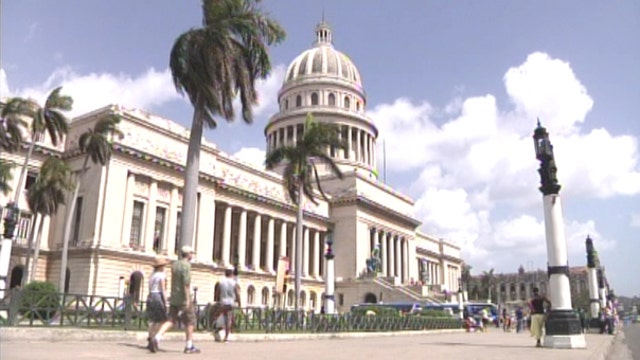As Embassies Reopen, Firms Look to Cuba for Expansion
The opening of the U.S. and Cuban embassies Monday further indicates that the two nations are on the path to normalized relations. Several U.S. companies aren’t wasting any time and are already making a push into the Cuban market.
A Tale of Two Embassies
The United States’ diplomatic outpost in Havana, called an interests section, is in the same building that served as its embassy until 1961. It was during that year when President Eisenhower broke off diplomatic relations with Cuba amid tensions with Fidel Castro’s regime.
According to the New York Times, Obama administration officials believe they do not need Congress to approve new money for the building.
It is unclear at this time who will be the new ambassador to Cuba, though Diplomat Jeffrey DeLaurentis is currently in charge of the interests section and holds the technical rank of ambassador. DeLaurentis has served as a deputy assistant secretary of state in the United Nations and as the political-economic section chief in Havana.
On the Cuban side, an interests section exists in the Adams Morgan section of Washington, D.C. The country announced in May that its banking services for that office had been restored, which were needed prior to reopening the embassy.
“Re-establishing top level diplomatic representation is a solid step signaling that negotiations based on engagement rather than isolation have been so far productive,” said IHS Country Risk Senior Analyst Diego Moya-Ocampos.
Setting Sail for Cuba
Several major U.S. corporations see improved relations between the U.S. and Cuba as a major opportunity to expand into a new market. Carnival Corp (NYSE:CCL) recently received U.S. approval to operate cruises to Cuba.
Tara Russell, president of Carnival’s fathom brand told FOXBusiness.com that she does not foresee any issues with receiving approval from the Cuban government.
“Having already received U.S. approval will help us move more quickly on the Cuban side,” said Russell.
Fathom operates social impact cruises, which it says provide “the opportunity to build community with like-minded travelers, become immersed in another culture, and work alongside its people…”
Part of the U.S. Department of Treasury’s decision to allow licensed travel companies to transport approved travelers to Cuba requires that they engage in educational and cultural exchanges with the Cuban people.
Fathom will operate seven-day cruises from Miami to the Dominican Republic beginning in April 2016. In May, voyages to the Dominican and Cuba will be offered on a regular basis.
“We know there is strong demand from travelers who want to immerse themselves in Cuban culture, so this is a historic opportunity for us to enable more people to experience Cuban society,” said Arnold Donald, President and CEO of Carnival Corporation.
The social impact cruises to Cuba are already being sold on fathom’s website, though the deposit is fully refundable.
Russell says between now and when the ship sets sail, fathom will work to immerse itself in the Cuban culture and figure out what the priorities of the residents there are. She says they have been actively involved in the Dominican Republic for 10 years doing just that.
“It’s important that we don’t make assumptions about Cuba or cookie cutter our missions,” said Russell.
While Carnival is the most visibly invested company in Cuban expansion, others have expressed interest in business endeavors within the country.
Hilton (NYSE:HLT) Worldwide’s Director of Corporate Communications in the Caribbean and Latin America Karla Visconti said they welcome new opportunities to continue their growth, “including Cuba if an agreement is reached with the U.S.”
Insurance giant Maurice “Hank” Greenberg is also looking to possibly expand in Cuba, as previously reported by FOX Business Network’s Charlie Gasparino. Greenberg, CEO of Starr International, met with senior level Cuban government officials back in June and has said that the company is monitoring possible insurance opportunities.
The Road Ahead
While the opening of the American and Cuban Embassies is a step in the right direction, significant constraints are still in place. A trade embargo and other key sanctions will likely remain until 2018, when incumbent President Raúl Castro is expected to step down. At that time, Congress may be able to lift the U.S. embargo on Cuba.
“Economic and potential political change in Cuba will continue to be gradual and at a pace at which the Cuban ruling establishment feels comfortable, but strong trade and investment incentives will be a driver to enable reform,” said Moya-Ocampos.




















